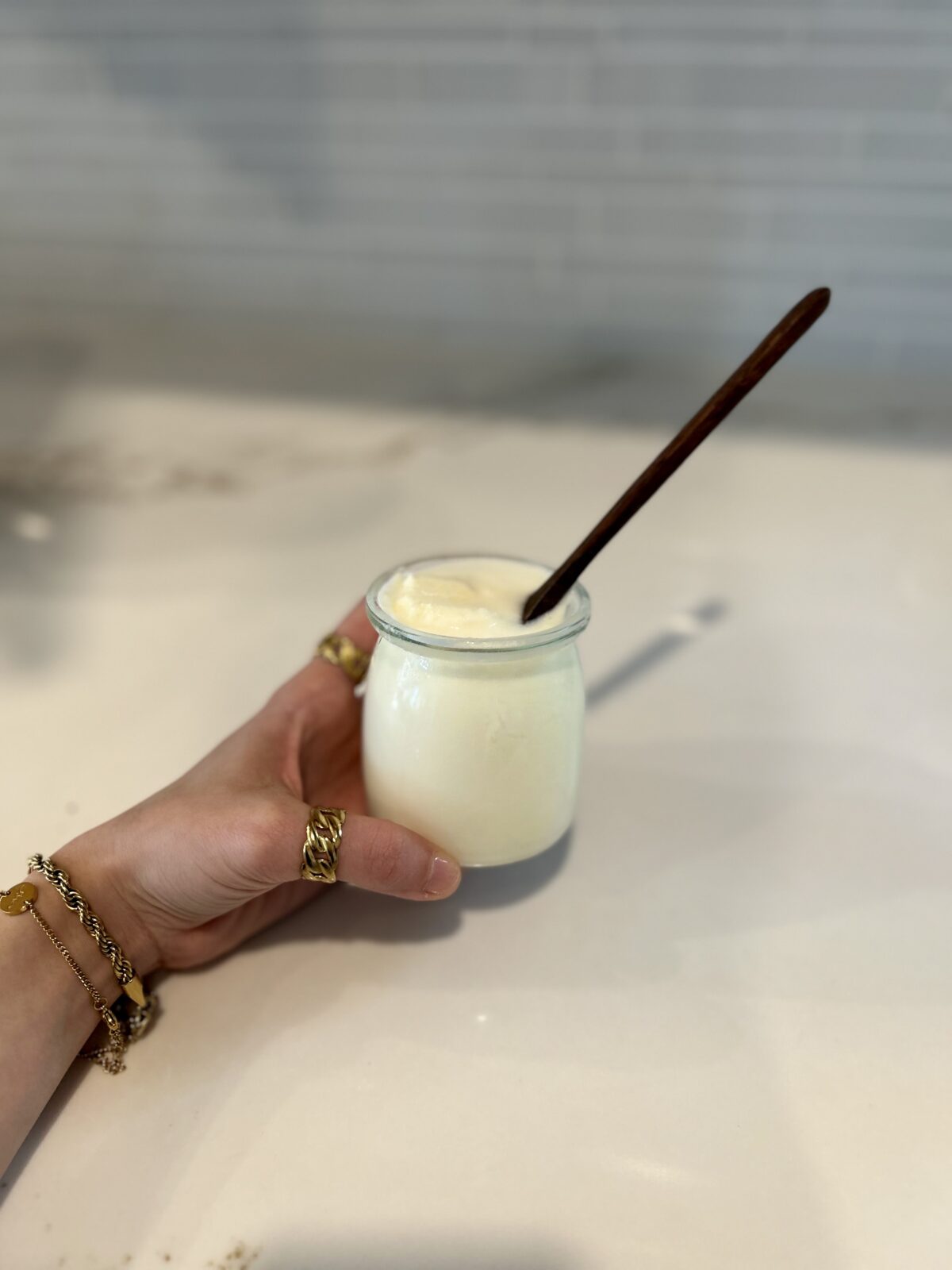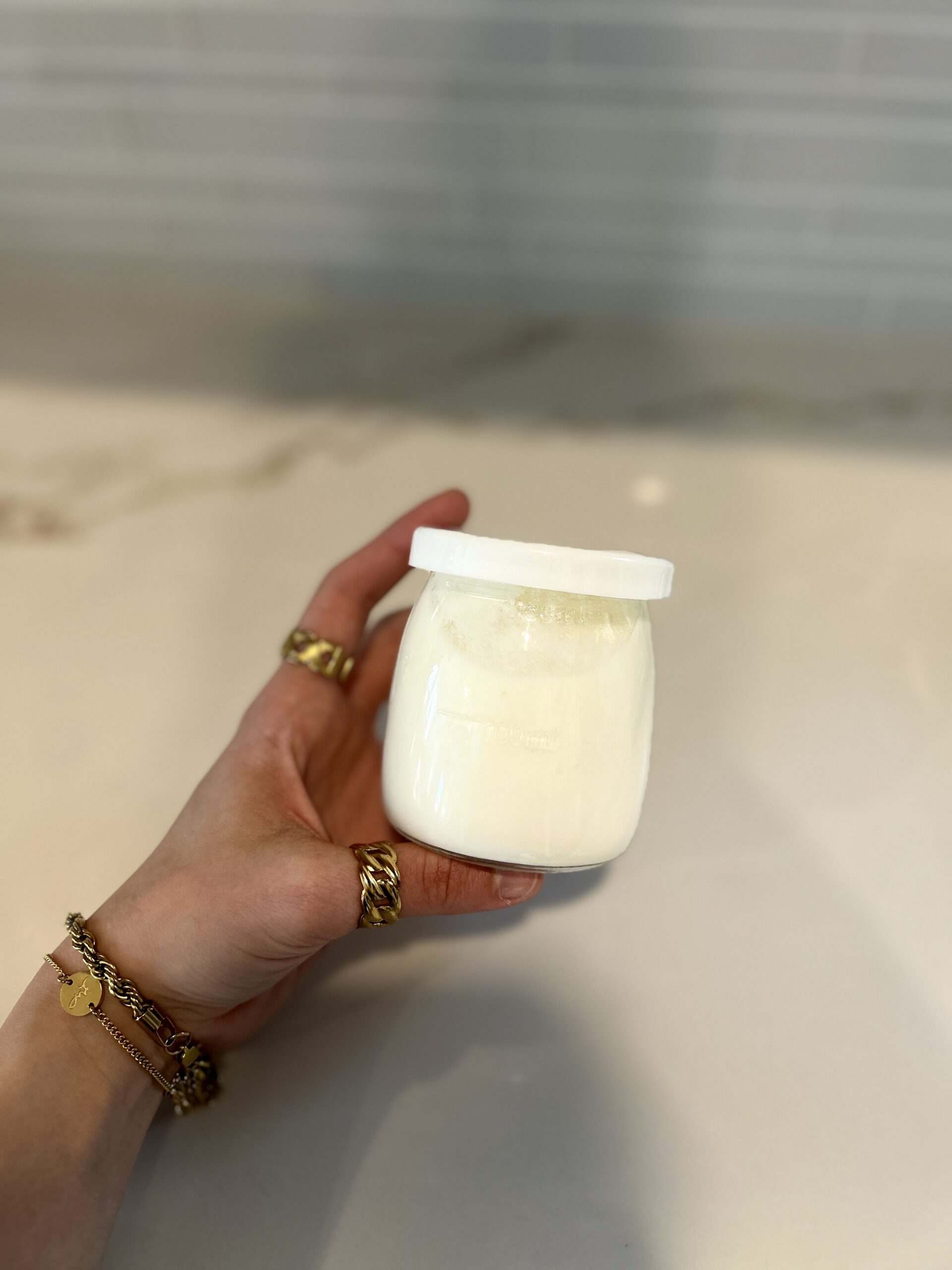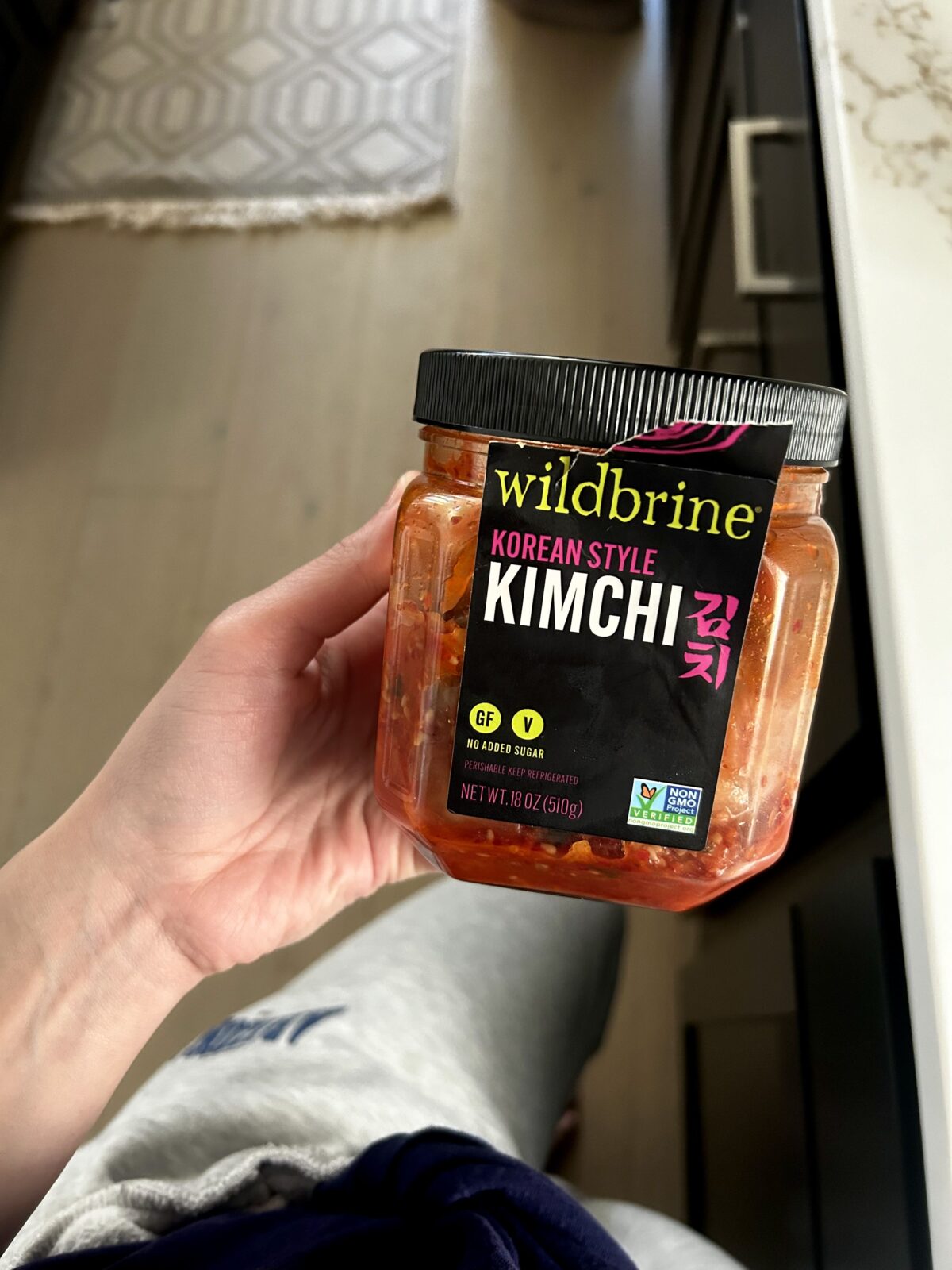A homemade probiotic-rich yogurt cup full of beneficial microorganisms ready to live in your gut microbiome and support your gut health, cognitive health, hormone health, mental health, and if you are pregnant, you and your baby’s health. Adding probiotic strains to ferment in yogurt allows them to multiply and digest easier as well survive intestinal transit ensuring optimal nutrition.
Homemade Probiotic Rich Yogurt
Serving Size: 10 one-half cup servings or – three-fourth cup servings. (Jars are 180 ml ~ 3/4 cup)
Have you ever tried DIYing your own probiotic yogurt using the probiotic supplements that you currently take? The options are endless when creating your own specialty yogurt once you understand the different types and benefits of each probiotic strain that currently reside in your gut microbiome. They play a key role in energy, mood, skin, gut, brain, and hormone health. Every organ in the human body depends on a healthy and diverse gut microbiome. The neurotransmitters that directly affect your mood and cognitive health, serotonin and dopamine, are synthesized by specific microorganisms (probiotics) in your gut. When you take care of your gut microbiome, you are directly taking care of your cognitive (brain) and emotional health (mood).
These personalized live probiotic-rich yogurt cups have been an absolute gamechanger for me. My skin has been glowing, my focus has increased, my energy levels are double what they used to be. You simply can’t neglect your gut microbiome health and the diversity of beneficial microorganisms residing there (or lack of).


Homemade Probiotic-Rich Yogurt
Equipment
- 1 Yogurt maker machine to maintain at 100°F for 36 hours
- 1 Yogurt starter culture from previous initial batch (at least 3-5 tablespoons of previous batch) or the initial starter containing 10 tablets BioGaia Gastrus
- 1 Thermometer
- 1 Blender
Ingredients
- 6 cups organic half and half (interchangeable with goat milk or coconut milk)
- 3 tbsp inulin powder (natural soluble fiber unflavored)
- 1 high quality probiotic supplement
The Toppings
- 1/4 cup Kimchi (For that savory taste as well as additional prebiotic and probiotic benefits.)
- 1 tsp Ceylon cinnamon as a blood sugar friendly sweetener.
- 1 tbsp Vanilla extract, honey, or maple syrup for a sweetened yogurt.
- 1 tsp Saffron spice for mood benefits.
Instructions
- Heat the half and half until it reaches 105°F.
- Remove from heat.
- Stir in the initial yogurt starter culture along with inulin powder or add in the 3-5 tablespoons of previous batches along with inulin powder and probiotic supplement of your choosing.
- Blend all ingredients well in a blender.
- Pour mixture into glass containers or small glass jars to incubate at a consistent temperature of 100°F for 36 hours to ferment and thicken.
- Refrigerate the yogurt after the fermentation process is complete after 36 hours to end the fermentation process.
Notes

Live Probiotic Strains That You Can Add To Your Yogurt
- Akkermansia muciniphila (A. muciniphila): particularly effective in increasing mucus thickness and increasing gut barrier function1, increases GLP-1 production which promotes feelings of satiety (reducing food intake and encouraging weight loss), and reduces increased gut permeability (leaky gut). Click here for a high quality Akkermanisa probiotic supplement.
You can assess your gut microbiome health and test Akkermansia levels, as well as other beneficial gut bacteria, by ordering a GI-MAP Stool Test. Click the link here for a basic overview and understanding of the GI-MAP Stool Test.
- Saccharomyces boulardii (S. boulardii): Studies show that this specific probiotic strain helps support digestive health in a variety of chronic health conditions: IBS, IBD (Crohn’s disease), and H.Pylori. Administration of S. boulardii during antibiotic therapy has certain advantage over bacterial probiotics due to its fungal natural properties-it is intrinsically resistant to the antibiotics and cannot promote the spread of antimicrobial resistance.2
- Lactobacillus reuteri (L. reuteri): In humans, L. reuteri is found in different body sites, including the gastrointestinal tract, urinary tract, skin, and breast milk. The abundance of L. reuteri varies among different individuals.3 Benefits of this strain include the ability to strengthen the intestinal barrier, improves gut motility, and helpful in the management of gastrointestinal symptoms such as abdominal pain, diarrhea, and constipation. L. reuteri plays a key role in maintaining a balanced microbiota gut composition.
- Bifidobacterium bifidum (B. bifidum): Bifidobacteria typically represent the most abundant bacteria of the human gut microbiota in healthy breast-fed infants. Bifidobacteria are amongst the first microbial colonizers of the infant gut.4 Benefits of this probiotic include antibacterial features against pathogens like Helicobacter pylori5, and alleviation of inflammatory activities associated with certain chronic gut dysfunctions.6
Another possible use of these microorganisms includes the treatment of women during pregnancy. Such a probiotic administration strategy might be key in order to modulate the mother’s gut engraftment by B. bifidum cells prior to delivery and, therefore, to assure the establishment of an appropriate bifidobacterial community that will then be vertically inherited by the newborn.7
References
- Noora Ottman, Sharon Y. Geerlings, Steven Aalvink, Willem M. de Vos, Clara Belzer,
Action and function of Akkermansia muciniphila in microbiome ecology, health and disease,
Best Practice & Research Clinical Gastroenterology, Volume 31, Issue 6, 2017, Pages 637-642
https://doi.org/10.1016/j.bpg.2017.10.001. ↩︎ - Kaźmierczak-Siedlecka K, Ruszkowski J, Fic M, Folwarski M, Makarewicz W. Saccharomyces boulardii CNCM I-745: A Non-bacterial Microorganism Used as Probiotic Agent in Supporting Treatment of Selected Diseases. Curr Microbiol. 2020 Sep;77(9):1987-1996. doi: 10.1007/s00284-020-02053-9. Epub 2020 May 29. PMID: 32472262; PMCID: PMC7415030. ↩︎
- Mu Q, Tavella VJ, Luo XM. Role of Lactobacillus reuteri in Human Health and Diseases. Front Microbiol. 2018 Apr 19;9:757. doi: 10.3389/fmicb.2018.00757. PMID: 29725324; PMCID: PMC5917019. ↩︎
- Milani C., Duranti S., Bottacini F., Casey E., Turroni F., Mahony J., Belzer C., Delgado Palacio S., Arboleya Montes S., Mancabelli L., et al. The First Microbial Colonizers of the Human Gut: Composition, Activities, and Health Implications of the Infant Gut Microbiota. Microbiol. Mol. Biol. Rev. 2017;81 doi: 10.1128/MMBR.00036-17. ↩︎
- Chenoll E., Casinos B., Bataller E., Astals P., Echevarria J., Iglesias J.R., Balbarie P., Ramon D., Genoves S. Novel probiotic Bifidobacterium bifidum CECT 7366 strain active against the pathogenic bacterium Helicobacter pylori. Appl. Environ. Microbiol. 2011;77:1335–1343. doi: 10.1128/AEM.01820-10. ↩︎
- Guglielmetti S., Mora D., Gschwender M., Popp K. Randomised clinical trial: Bifidobacterium bifidum MIMBb75 significantly alleviates irritable bowel syndrome and improves quality of life—A double-blind, placebo-controlled study. Aliment Pharm. Ther. 2011;33:1123–1132. doi: 10.1111/j.1365-2036.2011.04633.x. ↩︎
- Turroni F, Duranti S, Milani C, Lugli GA, van Sinderen D, Ventura M. Bifidobacterium bifidum: A Key Member of the Early Human Gut Microbiota. Microorganisms. 2019 Nov 9;7(11):544. doi: 10.3390/microorganisms7110544. PMID: 31717486; PMCID: PMC6920858. ↩︎